Author's posts
Jun 11 2009
Four at Four
-
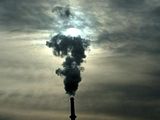 Well the U.S.-China climate talks have ended and the AFP reports China says no to binding greenhouse gas emissions cuts. China position is that since they see themselves as a developing nation, they have the right to increase emissions as they develop their economy and “raise the living standard of its people”.
Well the U.S.-China climate talks have ended and the AFP reports China says no to binding greenhouse gas emissions cuts. China position is that since they see themselves as a developing nation, they have the right to increase emissions as they develop their economy and “raise the living standard of its people”.For the U.S. response, US climate change envoy Todd Stern acknowledged, “we understand China’s paramount need to grow and develop for its people… our demand is that the development with the available technologies is based on low carbon growth.” The U.S. negotiators “backed down on insisting that China adopt a binding cap on emissions.”
-
The Guardian reports Climate change may be slowing U.S. winds. “The great gusting winds of the American midwest – and possibly the hopes for the most promising clean energy source – may be dying, in part because of climate change”.
A study, due to be published in August in the peer-reviewed Journal of Geophysical Research, suggests that average and peak winds may have been slowing across the midwest and eastern states since 1973…
“We have noted there have been some periods in the past … where there was a pretty substantial decrease in wind speed for 12 consecutive months,” Eugene Takle, the director of the climate science initiative at Iowa State University and one of the authors of the study, said. “We suspect that it’s some large-scale influence that we don’t yet understand.”
Areas of the midwest have seen a 10% decline in average wind speed over the past decade. Some places – such as Minnesota – have seen a jump in the number of days where there was no wind at all.
Takle said climate modelling suggested a further 10% decline in wind levels could occur over the next four decades. “Generally we expect there will probably be a decline in wind speeds due to climate change.”
The sharpest fall off in wind speeds recorded in the study occurred in the eastern United States including Ohio, Indiana, Kansas, Michigan, Illinois, Louisiana, northern Maine, western Montana and Virginia.
The findings are “preliminary” and the study has some “ambiguous” data, caution the authors.
Four at Four continues with five more stories today: Obama administration reinstating oil and gas leases, mountaintop removal, nuclear power lobby hijacking climage change legislation, Kyrgyzstan demands the U.S. military leave, and typhoons can cause earthquakes.
Jun 10 2009
Four at Four
-
The Guardian reports China launches green power revolution to catch up on the West by 2020. China has set the goal of producing 20 percent of its energy needs from renewable sources in 11 years.
“We are now formulating a plan for development of renewable energy. We can be sure we will exceed the 15% target. We will at least reach 18%. Personally I think we could reach the target of having renewables provide 20% of total energy consumption,” said Zhang Xiaoqiang, vice-chairman of China’s national development and reform commission.
China makes renewable power play to be world’s first green superpower, adds The Guardian.
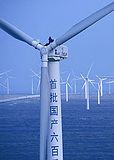 A game-changing moment could be upon us… This is no short-term economic boost or sop for climate change negotiations; it is a long-term investment aimed at making China a dominant force in the global low-carbon economy for decades to come. Power plays do not come much bigger.
A game-changing moment could be upon us… This is no short-term economic boost or sop for climate change negotiations; it is a long-term investment aimed at making China a dominant force in the global low-carbon economy for decades to come. Power plays do not come much bigger.The size of the energy stimulus has not yet been revealed, but reports in the domestic media and from foreign diplomats suggest between 1.4 trillion (US$200 bn) and 4.5 trillion yuan (US$600bn) will be invested over the next ten years in nuclear power plants, solar and wind farms, hydroelectric dams, “green transport”, “clean coal” and super efficient electric grids.
The consequences will be staggering. If the bigger figure proves correct, China will be spending the equivalent of its 2009 military budget on “new energy” for each of the next ten years.
Imagine what the U.S. could have done if it had spent the money it wasted on wars of choice in Iraq and Afghanistan on moving to green energy? Imagine what $607 billion that the U.S. spent on the military in 2008 could do to move the nation to renewable energy.
-
 Meanwhile, McClatchy reports Scientists state Global warming has already changed oceans. U.S. Senators were told by scientists that earth’s oceans “are already changing because of global warming” in a hearing of the oceans subcommittee of the Senate Commerce Committee. Oysters in Washington state have stop reproducing. Shrimp are migrating away from the Gulf of Mexico. The economic toll will be enormous.
Meanwhile, McClatchy reports Scientists state Global warming has already changed oceans. U.S. Senators were told by scientists that earth’s oceans “are already changing because of global warming” in a hearing of the oceans subcommittee of the Senate Commerce Committee. Oysters in Washington state have stop reproducing. Shrimp are migrating away from the Gulf of Mexico. The economic toll will be enormous.The extent of ocean acidification and oxygen-depleted dead zones are alarming. “Federal studies also found acidity levels in the North Pacific and off Alaska are unusually high compared to other ocean regions. The high acidity is already taking a toll of such tiny species as pteropods, which are an important food for salmon and other fish.”
“We must start to realize that there can be no standalone policies, especially as they relate to our water resources,” Alexandra Cousteau said. “Energy, transportation, climate change, infrastructure, agriculture, urban development: this is where our ocean policy must begin. It is all interconnected.”
Four at Four continues with lawsuits forcing torture transparency, Uighurs to Palau, and amphibians in Oregon and around the world are dying off.
Jun 09 2009
Four at Four
-
 The Guardian reports David Sandalow, the assistant secretary of state for energy, claims China alone could bring world to brink of climate calamity.
The Guardian reports David Sandalow, the assistant secretary of state for energy, claims China alone could bring world to brink of climate calamity.“China can and will need to do much more if the world is going to have any hope of containing climate change,” Sandalow said. He claimed if China continues business as usual, then that would “result in a 2.7C rise in global temperatures by 2050 even if every other country slashed greenhouse gas emissions by 80%.”
China’s position is the U.S. and other long-established industrialized nations “should cut emissions by 40% between 1990 and 2020, as well as paying 1% of their GDP to help poorer nations deal with the consequences and causes of climate change.”
The Washington Post adds the U.S. and China are at odds over emissions. “Senior U.S. and Chinese officials began three days of talks here Monday in hopes of making a breakthrough on climate change, but they remain far apart on the basic issue of who is to blame for carbon emissions and should shoulder the biggest burden for reducing them.”
Four at Four continues with an update from the Afghanistan-Pakistan border region, Peruvian indigenous leader Alberto Pizango seeks asylum, the power-grip of Ivy League schools over the Supreme Court, and the Obama administration defends torture cover-up and secrecy.
Jun 08 2009
Four at Four
World spends wastes $1.46 trillion on M-I-C in 2008
-
The Guardian reports Global military spending hits record levels and the United States accounts for more than half the total increase. Overall, the U.S. accounted for 42 percent of the world’s total military spending at $607 billion. China has the second highest amount of military expenditures at $84.9 billion.
“Global military expenditure has risen by 45% over the past decade to $1.46tn, according to the latest annual Yearbook on Armaments, Disarmament, and International Security published by the Stockholm International Peace Research Institute (Sipri).”
BBC News adds Military spending sets new record. “In contrast with civilian aerospace and airlines, the defence industry remains healthy… In total, the 100 leading defence manufacturers sold arms worth $347bn during 2007, the most recent year for which reliable data are available. Almost all the companies were American or European. Some 61% of the total was accounted for by 44 US companies, with 32 West European companies accounting for a further 31%. Other companies were Russian, Japanese, Israeli and Indian.”
-
The NY Times reports Supreme Court tells elected judges not to rule on major backers.
In a closely watched case involving the confluence of justice, politics and money, the Supreme Court ruled for the first time that the Constitution can require an elected judge to step aside in a particular case based on campaign spending in state judicial races.
In a 5-to-4 decision released on Monday, the high court found that the circumstances surrounding Justice Brent D. Benjamin of the West Virginia Supreme Court and a lawsuit involving the Massey Energy Company, his major campaign contributor, were so “extreme” that there was no question that Justice Benjamin should have disqualified himself…
“The facts now before us are extreme by any measure,” Justice Anthony M. Kennedy wrote for the majority. “The parties point to no other instance involving judicial campaign contributions that presents a potential for bias comparable to the circumstances in this case.”
Since judges may be influenced by large campaign contributions, why are politicians immune? Why should elected politicians be allowed to sponsor and vote on legislation on behalf of their major campaign contributors?
Four at Four continues with analysis on Pakistan, trouble for trust-funders, and why the private health insurance wants mandatory insurance.
Jun 05 2009
Four at Four
-
 The CS Monitor reports Another tough summer for Arctic sea ice is likely. According to the June 1 readings posted by the National Snow and Ice Data Center, this year’s annual melt-back of Arctic Ocean sea ice may break the 2007 record. “NSIDC researchers say they expect 2009 to be another year when the amount of sea ice left at summer’s end will fall short of the 1979-2000 average.”
The CS Monitor reports Another tough summer for Arctic sea ice is likely. According to the June 1 readings posted by the National Snow and Ice Data Center, this year’s annual melt-back of Arctic Ocean sea ice may break the 2007 record. “NSIDC researchers say they expect 2009 to be another year when the amount of sea ice left at summer’s end will fall short of the 1979-2000 average.”And according to a recent study published in Geophysical Research Letters, Winter Northern Hemisphere weather patterns remember summer Arctic sea-ice extent (pdf). So, the loss of Arctic ice in the summer means much less fall and winter rain and snow in Norther Europe, Alaska, and the parched Western U.S.
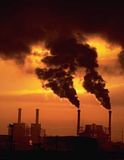 Meanwhile back in Washington, D.C., American industry lobbies Congress for permission to pollute more, according to the Washington Post. U.S. oil refiners are seeking special cap-and-trade allowances that could be worth millions of dollars.
Meanwhile back in Washington, D.C., American industry lobbies Congress for permission to pollute more, according to the Washington Post. U.S. oil refiners are seeking special cap-and-trade allowances that could be worth millions of dollars.Led by Rep. Gene Green (D-TX), oil refiners amended the pending climate change legislation to “give petroleum refiners valuable rights to emit carbon dioxide when it otherwise might not have been allowed. Refiners could get the extra allowances in return for cutting carbon emissions by 50 percent at a single point of a vast refinery complex instead of slashing emissions by 50 percent for the entire facility.”
In addition, Rep. John Dingell (D-MI) had inserted a change that “would give the auto industry $1.4 billion worth of extra allowances”. Coal industry lobbyists are also working to weaken then bill. Rep. Rick Boucher (D-VA) “led the effort to protect coal-fired utilities and mining firms.” 35 percent of the allowances are going to the coal power industry.
Four at Four continues with enriching the rich by eliminating jobs in America, an update from Pakistan, the “most serious threat to American wildlife in the past century”, and a better levee system for New Orleans found in the Netherlands.
Jun 04 2009
Four at Four
50 years of climate change in the Himalayas captured on camera
-
The Guardian reports in 50 years the Imja glacier in the Himalayas has been transformed by a warming climate from millennia-old glacial ice to a glacial lake. American mountain geographer Alton Byers returned to the place where Fritz Müller and Erwin Schneider once battled ice storms to take new panoramic photos of the glacier.
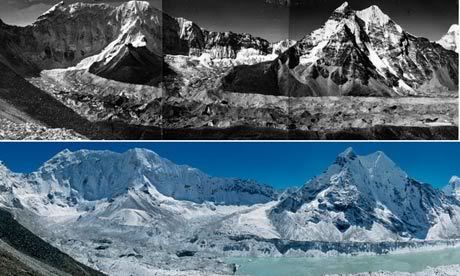
“The 1956 photograph of the Imja glacier, then one of the largest glaciers at an altitude of around 5,000m, shows a layer of thick ice with small meltwater ponds. But by the time Byers took his shot in 2007, much of the glacier had melted into a vast but stunning blue lake. Today, the Imja glacier, which is just 6km from Everest, continues to recede at a rate of 74m a year – the fastest rate of all the Himalayan glaciers.”
Four at Four continues with court review of warrantless eavesdropping, undoing Bush-era policy on deportation, and the possibility of a U.S.-China climate deal.
Jun 03 2009
Four at Four
-
The NY Times reports a U.S. report finds errors in Afghan airstrikes. “A military investigation has concluded that American personnel made significant errors in carrying out some of the airstrikes in western Afghanistan on May 4 that killed dozens of Afghan civilians, according to a senior American military official.”
“Had the rules been followed, at least some of the strikes by American warplanes against half a dozen targets over seven hours would have been aborted. The report represents the clearest American acknowledgment of fault in connection with the attacks.“
Four at Four continues with Cheney oversaw torture Congressional briefings, Iraq halts cleaning up unexploded ordinance, and green energy investment passses fossil fuel investment.
Jun 02 2009
Four at Four
-
Politico reports Pentagon budget faces shortfall The Obama administration “understated the military’s true personnel costs when the president submitted his war funding request in April… “The Pentagon said Monday it now estimates it faces an additional $2.35 billion shortfall in personnel accounts for the remainder of this fiscal year ending Sept. 30. Nearly three-quarters of the money would go to the Army and Army National Guard, which have blown far past their 2009 manpower targets, thanks to a bad economy and a system of often costly enlistment bonuses.”
Four at Four continues with Obama in Egypt, how we’re losing the war in Afghanistan, and Pakistan frees cleric allegedly linked to Mumbai terrorist attacks.
Jun 01 2009
Four at Four
-
The LA Times reports Iraqi casualties fall to record low in May. “The death toll for the month, 165, is about half that of April. Meanwhile, 24 American military personnel were killed, an eight-month high… According to Iraq’s Interior Ministry, 165 Iraqis died in violence in May, 134 of them civilians and 31 of them members of the Iraqi security forces.”
Four at Four continues with an update from Pakistan, Geithner in China, and bumblebee extinction.
May 29 2009
Four at Four
-
The Guardian reports Global warming causes 300,000 deaths a year, says Kofi Annan thinktank.
Climate change is already responsible for 300,000 deaths a year and is affecting 300m people, according to the first comprehensive study of the human impact of global warming.
It projects that increasingly severe heatwaves, floods, storms and forest fires will be responsible for as many as 500,000 deaths a year by 2030, making it the greatest humanitarian challenge the world faces.
Economic losses due to climate change today amount to more than $125bn a year – more than all the present world aid. The report comes from former UN secretary general Kofi Annan’s thinktank, the Global Humanitarian Forum. By 2030, the report says, climate change could cost $600bn a year.
Civil unrest may also increase because of weather-related events, the report says: “Four billion people are vulnerable now and 500m are now at extreme risk. Weather-related disasters … bring hunger, disease, poverty and lost livelihoods. They pose a threat to social and political stability”.
-
Nature News reports Geological survey quantifies undiscovered gas and oil in the Arctic. “Around a third of the world’s yet-to-be discovered gas resources and 13% of its undiscovered oil reserves may lie north of the Arctic Circle,” according to research published in Science. The results “fills in details of preliminary mapping results announced last year by the US Geological Survey”.
The estimates are based purely on geological data, and take no account of whether the oil and gas stores are technically recoverable or how much it would cost to exploit them. Nor do they address the environmental and cultural damage that might be inflicted by attempting to drill for oil or gas. Nonetheless, claims Donald Gautier, who led the research, “they give us insight into future petroleum resources, political relations, and places that environmental conflicts may occur”.
 The LA Times adds Arctic fossil fuel estimates are small in comparision. “The estimate is relatively small compared with known reserves in the major oil-exporting countries, but it is likely to greatly benefit Russia, which has the largest territory in the region, the researchers noted. However, they said, the most likely place for oil in the Arctic is off northern Alaska in the Chukchi Sea.”
The LA Times adds Arctic fossil fuel estimates are small in comparision. “The estimate is relatively small compared with known reserves in the major oil-exporting countries, but it is likely to greatly benefit Russia, which has the largest territory in the region, the researchers noted. However, they said, the most likely place for oil in the Arctic is off northern Alaska in the Chukchi Sea.”McClatchy notes that One-fifth of the estimated 20,000 to 25,000 polar bears in the world live on the coast of Alaska’s Beaufort and Chukchi seas. “Two-thirds of the world’s polar bears, including those along the coasts of Alaska and Russia, are projected to disappear” due to the “loss of vast expanses of polar sea ice” caused by climate change.
Four at Four continues with a timeout for wilderness exploitation, hard times for organic dairies, and Doctor Who squeeeee!
May 28 2009
Four at Four
-
The LA Times reports the FBI is planning a bigger role in terrorism fight.
The FBI and Justice Department plan to significantly expand their role in global counter-terrorism operations, part of a U.S. policy shift that will replace a CIA-dominated system of clandestine detentions and interrogations with one built around transparent investigations and prosecutions.
Under the “global justice” initiative, which has been in the works for several months, FBI agents will have a central role in overseas counter-terrorism cases. They will expand their questioning of suspects and evidence-gathering to try to ensure that criminal prosecutions are an option, officials familiar with the effort said.
-
The NY Times reports 29 militants killed in Afghanistan. “American and Afghan forces backed by airstrikes engaged in a ‘fierce firefight’ with Taliban insurgents in a remote and mountainous region of eastern Afghanistan on Thursday, killing at least 29 militants in an effort to capture” Mullah Sangeen, a “‘fairly significant’ commander of the Haqqani network, a radical group headed by Taliban commander Maulavi Jalaluddin Haqqani that is believed to be behind some of the largest attacks in recent years.”
The military claimed “no noncombatants were injured during this operation”. While “a Taliban spokesman… gave a vastly different account of the battle, saying that its militants had killed 15 coalition forces and captured four Afghan police officers.” He claimed no Taliban fighters had been killed.
Four at Four continues with an update from Pakistan and John Kerry’s take on U.S.-China climate negotiations.
May 27 2009
Four at Four
-
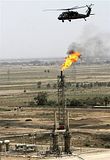 Reuters reports Iraq starts oil exports from Kurdistan. “Iraq started exporting oil from its largely autonomous Kurdistan region for the first time on Wednesday, Iraq’s Oil Ministry said, in an apparent breakthrough after years of deadlock over disputed Kurdish oil contracts.” The oil is flowing over pipelines to the “Turkish port of Ceyhan at an initial test rate of 10,000 barrels per day”.
Reuters reports Iraq starts oil exports from Kurdistan. “Iraq started exporting oil from its largely autonomous Kurdistan region for the first time on Wednesday, Iraq’s Oil Ministry said, in an apparent breakthrough after years of deadlock over disputed Kurdish oil contracts.” The oil is flowing over pipelines to the “Turkish port of Ceyhan at an initial test rate of 10,000 barrels per day”.The Financial Times adds Baghdad may yet fulfill its potential. “After almost 40 years of exile, international oil companies are about to return to Iraq. For companies such as BP, Shell, Total and ExxonMobil, Iraq represents the biggest opportunity in decades.”
A reason for war? “International groups have been short of opportunities to tap easy oil as oil-rich countries have closed their borders to them and relied on their own national companies and on service contractors”.
Meanwhile, the NY Times reports “A roadside bomb killed three Americans traveling in Falluja,” including State Department official Terrence Barnich, the deputy director of the Iraq Transition Assistance Office in Baghdad. “The attack also killed an American soldier and a civilian working for the Defense Department.” The AP adds May was “the deadliest month for the American military since September.”
Four at Four continues with CO2 emissions, national security changes, and Sotomayor is the antithesis of the Republicans’ “stealth candidate”.
